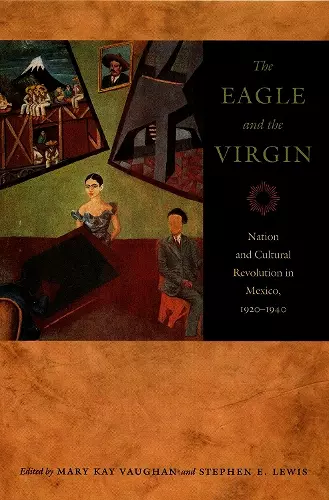The Eagle and the Virgin
Nation and Cultural Revolution in Mexico, 1920–1940
Stephen Lewis editor Mary Kay Vaughan editor
Format:Hardback
Publisher:Duke University Press
Published:13th Mar '06
Currently unavailable, and unfortunately no date known when it will be back

Collection of essays focusing on cultural policy and production after the Mexican revolution
When the fighting of the Mexican Revolution died down in 1920, the national government faced the daunting task of building a cohesive nation. It had to establish control over a disparate and needy population and prepare the country for global economic competition. As part of this effort, the government enlisted the energy of artists and intellectuals in cultivating a distinctly Mexican identity. It devised a project for the incorporation of indigenous peoples and oversaw a vast, innovative program in the arts. The Eagle and the Virgin examines the massive nation-building project Mexico undertook between 1920 and 1940.
Contributors explore the nation-building efforts of the government, artists, entrepreneurs, and social movements; their contradictory, often conflicting intersection; and their inevitably transnational nature. Scholars of political and social history, communications, and art history describe the creation of national symbols, myths, histories, and heroes to inspire patriotism and transform workers and peasants into efficient, productive, gendered subjects. They analyze the aesthetics of nation building made visible in murals, music, and architecture; investigate state projects to promote health, anticlericalism, and education; and consider the role of mass communications, such as cinema and radio, and the impact of road building. They discuss how national identity was forged among social groups, specifically political Catholics, industrial workers, middle-class women, and indigenous communities. Most important, the volume weighs in on debates about the tension between the eagle (the modernizing secular state) and the Virgin of Guadalupe (the Catholic defense of faith and morality). It argues that despite bitter, violent conflict, the symbolic repertoire created to promote national identity and memory making eventually proved capacious enough to allow the eagle and the virgin to coexist peacefully.
Contributors. Adrian Bantjes, Katherine Bliss, María Teresa Fernández, Joy Elizabeth Hayes, Joanne Hershfield, Stephen E. Lewis, Claudio Lomnitz, Rick A. López, Sarah M. Lowe, Jean Meyer, James Oles, Patrice Olsen, Desmond Rochfort, Michael Snodgrass, Mary Kay Vaughan, Marco Velázquez, Wendy Waters, Adriana Zavala
“The Eagle and the Virgin is a necessary book, a selection of essays which allows readers to see in detail how a nation is invented and reinvented, how it experiences its achievements and its customs, both the good and the bad; and how it is internationalized and nationalized (since by 1940 Mexico was both a more cosmopolitan country and a more Mexican one). A delightful work.”—Carlos Monsiváis
“Steeped in a generation of new cultural and transnational analysis of state formation and popular expression, The Eagle and the Virgin raises the bar for studies of nation building and cultural politics in postrevolutionary Mexico. Particularly impressive is the volume’s sensitive analysis of contests over religious culture and symbols, its gendered understanding of state formation, and its handsomely illustrated treatment of the development of a Mexican revolutionary aesthetic.”—Gilbert M. Joseph, coeditor of The Mexico Reader: History, Culture, Politics
“The 16 essays that Mary Kay Vaughan and Stephen E. Lewis have compiled here inventively probe and synthesize the synergistic processes of nation building and cultural revolution that characterized Mexico in the period from 1920 to 1940. . . . The vibrancy and variety of these essays remind us that culture is integral to any analysis of this crucial period in the formation of Mexican national identity, because Mexico’s cultural revolution is so inimitable in its many contested manifestations. As this volume demonstrates, its very creativity and inconsistency are fundamental to understanding the complexity of the interactions that took place between the state and popular sectors.” -- Susan M. Deeds * Hispanic American Historical Review *
ISBN: 9780822336570
Dimensions: unknown
Weight: 717g
396 pages